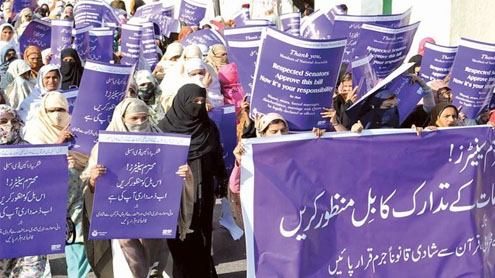 The passage of the Criminal Laws (Amendment) Act 2011 by the Senate on Monday means that it only needs presidential assent, which is expected to follow, to make forced marriages (particularly to the Holy Quran, so as to deprive women of their rightful share of property), acid throwing, physical violence against wives, and sexual torture criminal actions, by amending the Pakistan Penal Code and the Criminal Procedure Code.
The passage of the Criminal Laws (Amendment) Act 2011 by the Senate on Monday means that it only needs presidential assent, which is expected to follow, to make forced marriages (particularly to the Holy Quran, so as to deprive women of their rightful share of property), acid throwing, physical violence against wives, and sexual torture criminal actions, by amending the Pakistan Penal Code and the Criminal Procedure Code.
While these actions were offences under existing laws, their being brought to Parliament in the shape of the Anti-Women Practices Bill and the Acid Crime Prevention Bill indicates that they had crept into society as established practices to the extent that they have now become a menace. Also, the actions have all been given enhanced sentences, from seven to 14 years imprisonment. The universal horror in which these customs are held can be judged from the fact that the Treasury in the Lower House had adopted as its own a private member’s bill, and it was passed unanimously by all parties, Treasury and Opposition alike. The main question around the Bill was raised during the Senate debate by the PML-N’s Raja Zafarul Haq as well as Leader of the House Nayyer Hussain Bokhari, that of implementation.
It is true that a number of measures, whether passed by Parliament or promulgated by a military ruler, have often been ignored, with society treating those laws as dead letters even before they began operating. Raja Zafar’s suggestion of an awareness committee was thus important, and a worthwhile suggestion that deserves serious consideration. Only if women are made aware that these injustices are crimes, will they be in a position to register cases if they are made victims.
In this context, the suggestion by Senator Jamal Leghari, that the landlords of Sindh and the chiefs of Baloch tribes ensure that the rights of women are not violated in their respective areas and tribes, deserves attention, for Senator Leghari is himself the chief of the Leghari tribe in the Punjab. And apart from anything else, he showed the need for the measure to find ownership among those locally prominent, and pointed to those who should also be the targets of the awareness campaign that Senator Zafar recommended.
In the end, though, it has to be the government which has to exercise due vigilance, and ensure that the laws of the land are obeyed. Though in this particular case, it is all the more important, because not just the cause of women is affected, but the fair name of Islam is also besmirched by offenders. The government should realise that if it allows selectivity, both in which laws are applied, and to whom they are applied, it will not only bring hardship for women victims, but make it impossible to govern society. – Nation












